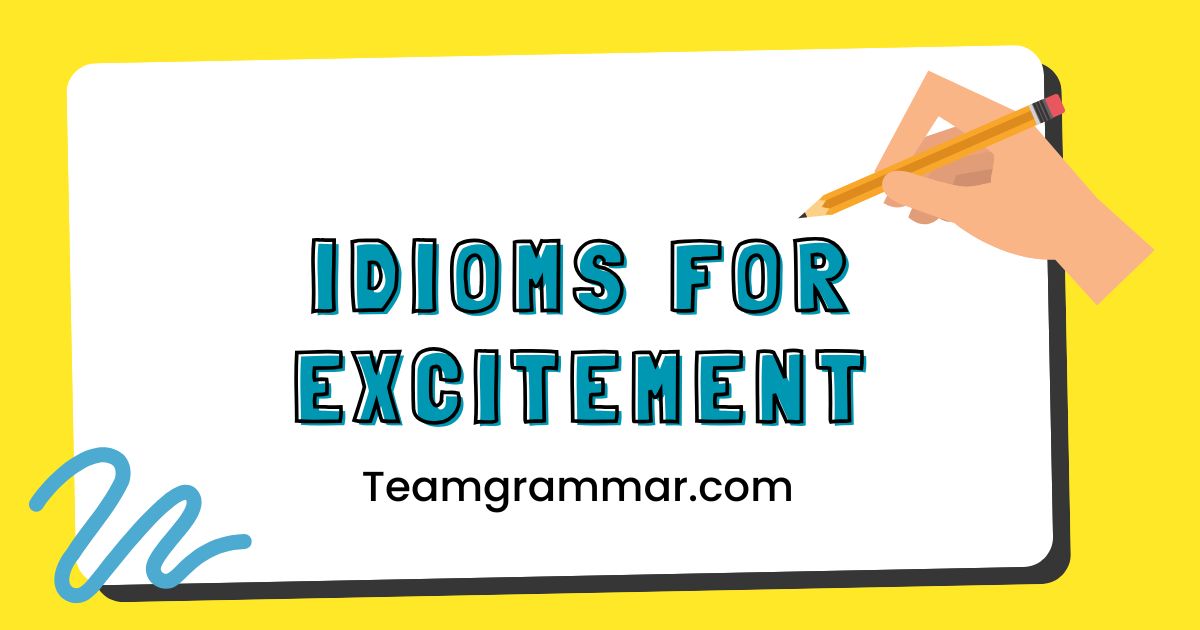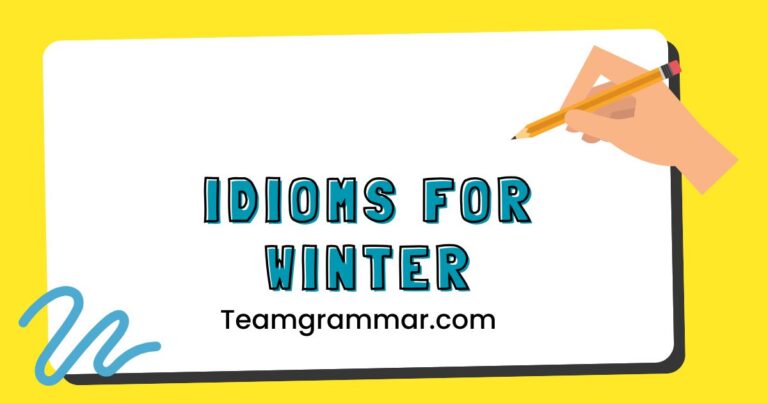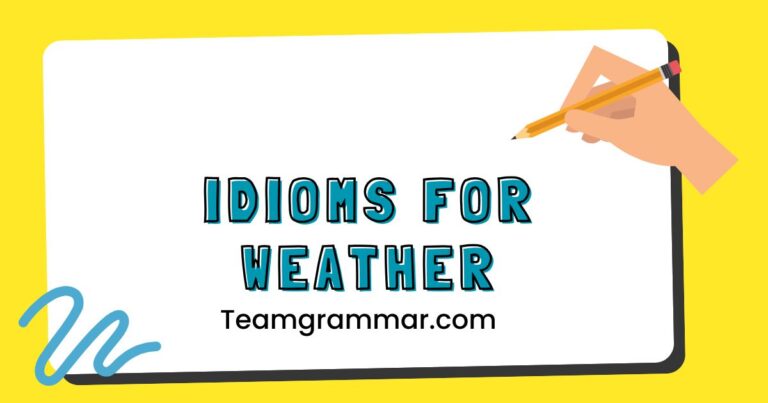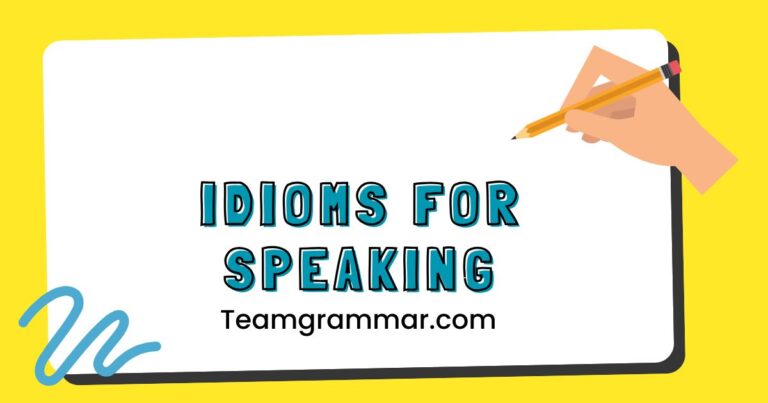40 Idioms for Excitement: Mastering Expressive English Phrases
Understanding and using idioms adds color and depth to your English communication. When expressing excitement, relying on simple words like “happy” or “excited” can sometimes fall short.
Idioms offer a vibrant and engaging way to convey the intensity of your feelings. This article delves into a range of idioms that capture the essence of excitement, helping you to speak and write with greater expressiveness and nuance.
This comprehensive guide is suitable for English language learners of all levels, from beginners seeking to expand their vocabulary to advanced speakers aiming to refine their expressive abilities.
Table of Contents
- Introduction
- Definition of Idioms for Excitement
- Structural Breakdown of Excitement Idioms
- Types and Categories of Excitement Idioms
- Examples of Idioms for Excitement
- Usage Rules for Excitement Idioms
- Common Mistakes with Excitement Idioms
- Practice Exercises
- Advanced Topics in Excitement Idioms
- Frequently Asked Questions (FAQ)
- Conclusion
Definition of Idioms for Excitement
An idiom is a phrase or expression whose meaning cannot be understood from the ordinary meanings of the words in it. It is a figurative language construct, where the collective meaning differs from the literal interpretation of individual words.
Idioms for excitement are specific phrases that express a state of intense enthusiasm, eagerness, or joy. These idioms add color and emotional depth to language, allowing speakers to convey feelings more vividly than simple adjectives like “happy” or “excited” alone.
These idioms are often culturally specific, meaning their usage and understanding can vary across different English-speaking regions. Therefore, familiarity with these idioms enhances one’s comprehension of spoken and written English, especially in informal contexts.
They function as a linguistic shortcut, instantly conveying a complex emotional state.
The classification of these idioms falls under the broader category of figurative language, specifically idioms of emotion. Their function is primarily expressive, serving to communicate the intensity and nature of one’s excitement.
Context is crucial in understanding and appropriately using these idioms; misapplication can lead to miscommunication or sound unnatural. For example, using an idiom that implies uncontrollable excitement might be inappropriate in a formal business setting.
Structural Breakdown of Excitement Idioms
Excitement idioms, like all idioms, do not follow standard grammatical rules when interpreted literally. Their structure is often fixed, meaning the words cannot be easily changed or reordered without losing the idiomatic meaning.
The structural elements can vary widely, including verb phrases, prepositional phrases, and even complete clauses.
Understanding the structure often involves recognizing the key components that contribute to the overall meaning. For example, in the idiom “on cloud nine,” the preposition “on” and the noun phrase “cloud nine” are essential elements.
Altering these elements would destroy the idiom’s meaning. The verb phrase “jump for joy” relies on the action verb “jump” and the prepositional phrase “for joy” to convey a physical manifestation of excitement.
Many excitement idioms employ metaphorical language, comparing the feeling of excitement to tangible experiences. This metaphorical structure is crucial for understanding the idiom’s intended meaning.
For instance, “to have butterflies in your stomach” uses the image of butterflies to represent the nervous anticipation often associated with excitement.
The patterns in excitement idioms often involve exaggerations or hyperboles to emphasize the intensity of the emotion. Phrases like “over the moon” or “on top of the world” use extreme spatial metaphors to convey a sense of unparalleled joy and excitement.
Recognizing these patterns can help learners identify and understand new excitement idioms more easily.
Types and Categories of Excitement Idioms
Excitement idioms can be categorized based on the specific nuance of excitement they convey. Here are some categories:
Idioms for Overjoyed Excitement
These idioms express a feeling of extreme happiness and delight, often beyond the ordinary.
Idioms for Anticipatory Excitement
These idioms describe the feeling of eagerness and anticipation before an event or experience.
Idioms for Thrilled Excitement
These idioms convey a sense of intense pleasure and exhilaration.
Idioms for Eager Excitement
These idioms express a strong desire and enthusiasm to do something or experience something.
General Excitement Idioms
These idioms are used to express excitement in a general sense, without specifying a particular nuance.
Examples of Idioms for Excitement
Here are some examples of idioms for excitement, categorized by the type of excitement they express. Each idiom is provided with a definition and example sentence to illustrate its usage.
Idioms for Overjoyed Excitement
These idioms capture feelings of extreme happiness and delight.
The following table provides 20 examples of idioms that express overjoyed excitement, along with their definitions and example sentences to illustrate their usage in context.
| Idiom | Definition | Example Sentence |
|---|---|---|
| On cloud nine | Extremely happy; in a state of perfect bliss. | She was on cloud nine after receiving the acceptance letter from her dream university. |
| Over the moon | Extremely pleased and happy. | They were over the moon when they found out they were expecting a baby. |
| On top of the world | Feeling extremely happy and successful. | After winning the championship, the team felt on top of the world. |
| Walking on air | Feeling extremely happy and elated. | Ever since their first date, she’s been walking on air. |
| In seventh heaven | In a state of perfect happiness. | He was in seventh heaven after his book became a bestseller. |
| Tickled pink | Very pleased or amused. | Grandma was tickled pink by the handmade card her granddaughter gave her. |
| Happy as a clam | Very happy and content. | He’s been as happy as a clam ever since he retired and moved to the beach. |
| Grinning from ear to ear | Smiling widely and broadly. | She was grinning from ear to ear when she opened her birthday presents. |
| Floating on air | Feeling extremely happy and light. | After the positive feedback on her presentation, she was floating on air. |
| Like a dog with two tails | Extremely happy and excited. | The kids were like dogs with two tails when they heard they were going to Disneyland. |
| Jumping for joy | Expressing great happiness by jumping. | He was jumping for joy when he found out he passed the exam. |
| Happy camper | A person who is content and satisfied. | With his new job and apartment, he’s a happy camper. |
| Got a kick out of it | To derive great pleasure or amusement from something. | I really got a kick out of watching that comedy show last night. |
| In good spirits | In a happy and cheerful mood. | Despite the challenges, she remained in good spirits. |
| Life of Riley | Living a luxurious and carefree life. | Since winning the lottery, he’s been living the life of Riley. |
| On a high | In a state of euphoria or excitement. | She was on a high after performing on stage. |
| Singing someone’s praises | To express enthusiastic approval or admiration. | The manager was singing his praises after he closed the big deal. |
| Feeling great | Experiencing physical or emotional well-being. | After a good night’s sleep, I’m feeling great and ready to tackle the day. |
| In high spirits | Cheerful and lively. | The team was in high spirits after their victory. |
| As pleased as punch | Extremely pleased and satisfied. | He was as pleased as punch with his new car. |
Idioms for Anticipatory Excitement
These idioms describe the excitement and eagerness felt before an event or experience.
The following table provides 20 examples of idioms that express anticipatory excitement, along with their definitions and example sentences.
| Idiom | Definition | Example Sentence |
|---|---|---|
| Have butterflies in your stomach | To feel nervous and excited before something important. | I always have butterflies in my stomach before giving a presentation. |
| On tenterhooks | In a state of suspense or agitation because of uncertainty. | We were on tenterhooks waiting for the test results. |
| Waiting with bated breath | Waiting anxiously and excitedly. | The audience was waiting with bated breath for the magician’s next trick. |
| All aflutter | Nervously excited and agitated. | She was all aflutter as she prepared for her wedding day. |
| Eager beaver | A person who is extremely enthusiastic and hardworking. | He’s such an eager beaver; he always volunteers for extra tasks. |
| Raring to go | Very enthusiastic and eager to start something. | The team is raring to go for the upcoming competition. |
| Chomping at the bit | Impatient and eager to start doing something. | The students were chomping at the bit to start their summer vacation. |
| Counting down the days | Anticipating an event with great excitement and marking off the days. | The kids are counting down the days until Christmas. |
| Can hardly wait | Very excited and eager for something to happen. | I can hardly wait for my vacation next month. |
| On the edge of your seat | Very excited, interested, and attentive. | The movie was so suspenseful that I was on the edge of my seat the whole time. |
| In a frenzy | A state of uncontrolled excitement or wild behavior. | The shoppers were in a frenzy on Black Friday. |
| Anticipating something great | Looking forward to something with excitement and positive expectation. | We are anticipating something great with the launch of our new product. |
| Buzzing with excitement | Filled with a lively feeling of anticipation and energy. | The office was buzzing with excitement as the awards ceremony approached. |
| Fired up | Enthusiastic and motivated. | The coach got the team fired up before the game. |
| Looking forward to | Anticipating with pleasure. | I’m really looking forward to seeing you next week. |
| Keen as mustard | Very enthusiastic and eager. | He’s keen as mustard to start his new job. |
| With great anticipation | Looking forward to something with excitement and expectation. | We await his arrival with great anticipation. |
| Waiting eagerly | Looking forward to something with eagerness and anticipation. | The children were waiting eagerly for Santa Claus. |
| Can’t wait | Expressing impatience and excitement for something to happen. | I can’t wait to see the new Star Wars movie! |
| Excited to bits | Extremely excited. | She was excited to bits about her upcoming trip. |
Idioms for Thrilled Excitement
These idioms convey a sense of intense pleasure and exhilaration.
The following table provides 20 examples of idioms that express thrilled excitement, along with their definitions and example sentences.
| Idiom | Definition | Example Sentence |
|---|---|---|
| Thrilled to bits | Extremely pleased and excited. | She was thrilled to bits when she won the lottery. |
| On a thrill ride | Experiencing something exciting and exhilarating. | Life with him is like being on a thrill ride. |
| Absolutely stoked | Extremely excited and enthusiastic. | He was absolutely stoked about his new surfboard. |
| Delighted | Feeling or expressing great pleasure. | We are delighted to announce the arrival of our new baby. |
| Elated | Extremely happy and excited. | She was elated by the news of her promotion. |
| Overjoyed | Extremely happy. | They were overjoyed to see their son return home safely. |
| Rapturous | Characterized by great joy or enthusiasm. | The audience gave a rapturous applause after the performance. |
| Blissful | Perfectly happy or delightful. | They spent a blissful day at the beach. |
| Jubilant | Feeling or expressing great happiness and triumph. | The team was jubilant after winning the championship. |
| Exhilarated | Feeling very happy, energized, and excited. | She felt exhilarated after completing the marathon. |
| In raptures | Filled with intense joy and delight. | The children were in raptures over their new toys. |
| Floating on air | Feeling extremely happy and light. | After the positive feedback on her presentation, she was floating on air. |
| In high glee | In a state of great delight and merriment. | The children were in high glee at the birthday party. |
| Walking on sunshine | Feeling extremely happy and positive. | Ever since she got the job, she’s been walking on sunshine. |
| Happy-go-lucky | Carefree and cheerful. | He’s a happy-go-lucky guy who always looks on the bright side. |
| In a state of bliss | In a state of perfect happiness. | They were in a state of bliss on their honeymoon. |
| Simply ecstatic | Feeling overwhelming happiness or joy. | She was simply ecstatic when she received the award. |
| Absolutely delighted | Completely pleased and happy. | We were absolutely delighted with the service at the hotel. |
| Tickled to death | Extremely pleased or amused. | Grandma was tickled to death by the flowers her grandson sent her. |
| On cloud nine | Extremely happy; in a state of perfect bliss. | She was on cloud nine after receiving the acceptance letter from her dream university. |
Idioms for Eager Excitement
These idioms express a strong desire and enthusiasm to do or experience something.
The following table provides 20 examples of idioms that express eager excitement, along with their definitions and example sentences.
| Idiom | Definition | Example Sentence |
|---|---|---|
| Eager to please | Wanting to satisfy or impress someone. | The new employee was eager to please his manager. |
| Raring to go | Very enthusiastic and eager to start something. | The team is raring to go for the upcoming competition. |
| Chomping at the bit | Impatient and eager to start doing something. | The students were chomping at the bit to start their summer vacation. |
| Keen to start | Enthusiastic and ready to begin. | He was keen to start his new project. |
| Anxious to begin | Eager and somewhat nervous to start something. | She was anxious to begin her first day at work. |
| Ready and willing | Prepared and eager to do something. | The volunteers were ready and willing to help. |
| Game for anything | Willing to try new things and adventures. | She’s game for anything, so she’s always fun to travel with. |
| Up for it | Willing and enthusiastic to do something. | Are you up for going to the concert tonight? |
| Burning with desire | Having a strong and intense longing for something. | He was burning with desire to travel the world. |
| Itching to do something | Having a strong urge to do something. | I’m itching to go on vacation. |
| Longing for something | Having a strong desire or yearning for something. | She was longing for a peaceful life in the countryside. |
| Yearning to achieve | Strongly wanting to accomplish a goal. | He was yearning to achieve his dreams of becoming a doctor. |
| Striving for excellence | Putting in effort to achieve high standards. | The students were striving for excellence in their studies. |
| Aspiring to greatness | Having a strong desire to achieve great things. | The young artist was aspiring to greatness in the art world. |
| Driven to succeed | Highly motivated to achieve success. | She was driven to succeed in her career. |
| Determined to win | Having a strong resolve to achieve victory. | The team was determined to win the championship. |
| Wanting something badly | Having a strong desire for something. | He was wanting a new car badly. |
| Enthusiastic about | Showing great interest and excitement for something. | She was enthusiastic about her new job. |
| Crazy about | Extremely fond of or enthusiastic about something. | They are crazy about playing soccer. |
| Passionate about | Having a strong and intense interest in something. | He is passionate about photography. |
General Excitement Idioms
These idioms are used to express excitement in a general sense, without specifying a particular nuance.
The following table provides 20 examples of general idioms that express excitement, along with their definitions and example sentences.
| Idiom | Definition | Example Sentence |
|---|---|---|
| In a state of excitement | Feeling a heightened level of enthusiasm and anticipation. | The children were in a state of excitement before the school trip. |
| All worked up | Agitated or excited, often to a degree of anxiety. | He got all worked up before the big game. |
| Full of beans | Lively and energetic. | The kids were full of beans after their nap. |
| High as a kite | In a state of great excitement or euphoria. | They were as high as a kite after winning the lottery. |
| Turned up to eleven | To increase something to its maximum level of intensity or excitement. | The party was turned up to eleven with loud music and dancing. |
| Like a kid in a candy store | Acting with unrestrained excitement and delight. | He was wandering around the car show like a kid in a candy store. |
| On fire | Performing exceptionally well or being very successful. | The team was on fire during the playoffs. |
| Buzzing | Filled with excitement or energy. | The city was buzzing with excitement during the festival. |
| Pumped up | Excited and enthusiastic. | The crowd was pumped up before the concert started. |
| Animated | Lively and enthusiastic. | She became very animated when discussing her favorite book. |
| Jazzed up | Excited and enthusiastic. | The team was jazzed up for the big game. |
| Sparked up | Energized and excited. | The audience was sparked up by the band’s performance. |
| In the zone | In a state of optimal performance and focus. | The athlete was in the zone during the final race. |
| On a roll | Experiencing a period of success or good fortune. | The company was on a roll with its new product launches. |
| In full swing | At the height of activity or excitement. | The party was in full swing by midnight. |
| Worked into a frenzy | Excited to the point of being uncontrolled. | The crowd was worked into a frenzy by the speaker’s passionate words. |
| Geared up | Prepared and excited for something. | The team was geared up for the championship game. |
| With gusto | With enthusiasm and energy. | They tackled the project with gusto. |
| Full of pep | Lively and energetic. | The team was full of pep before the game. |
| On a buzz | In a state of excitement or anticipation. | The city was on a buzz with the upcoming music festival. |
Usage Rules for Excitement Idioms
Using idioms correctly requires attention to context, tone, and audience. Here are some guidelines:
- Context: Choose idioms appropriate for the situation. Highly informal idioms might be unsuitable for formal settings.
- Audience: Consider your audience’s familiarity with idioms. Avoid using obscure idioms that might confuse them.
- Tone: Match the idiom to the intended tone. Some idioms are more humorous or lighthearted than others.
- Grammatical correctness: Ensure that the idiom fits grammatically into the sentence.
- Overuse: Avoid using too many idioms in a single conversation or piece of writing, as it can sound unnatural.
It’s essential to understand the specific meaning of an idiom before using it. Misusing an idiom can lead to confusion or miscommunication.
Pay attention to how native speakers use idioms in different contexts to get a better understanding of their nuances.
Some idioms may have variations or slightly different forms. Be aware of these variations and use the most common and widely understood form.
For example, “on cloud nine” is more common than “in cloud nine.”
Common Mistakes with Excitement Idioms
Here are some common mistakes learners make when using idioms for excitement:
| Mistake | Correct | Explanation | |
|---|---|---|---|
| Using the wrong idiom for the context. | Using “on cloud nine” to describe mild happiness. | Using “happy to hear that” instead. | “On cloud nine” implies extreme happiness, not just mild satisfaction. |
| Misunderstanding the meaning of an idiom. | Thinking “waiting with bated breath” means breathing heavily. | Understanding it means waiting anxiously. | “Bated” means restrained or lessened, not heavy. |
| Altering the words of an idiom. | Saying “over the moon and stars.” | Saying “over the moon.” | Idioms have fixed structures; changing them alters the meaning. |
| Using too many idioms in one sentence. | “I was over the moon and on cloud nine, so I was walking on air!” | “I was over the moon with excitement!” | Overusing idioms can make speech sound unnatural. |
| Applying idioms literally. | Interpreting “butterflies in your stomach” as actual butterflies. | Understanding it as nervous anticipation. | Idioms are figurative, not literal. |
Practice Exercises
Test your understanding of idioms for excitement with these exercises:
Exercise 1: Fill in the Blanks
Fill in the blanks with the appropriate idiom from the list below.
Idiom List:
* On cloud nine
* Butterflies in my stomach
* Over the moon
* Raring to go
* Chomping at the bit
| Question | Answer |
|---|---|
| 1. She was __________ after getting engaged. | Over the moon |
| 2. I have __________ before every performance. | Butterflies in my stomach |
| 3. The team is __________ for the championship game. | Raring to go |
| 4. He was __________ when he got the promotion. | On cloud nine |
| 5. The students are __________ for summer vacation. | Chomping at the bit |
| 6. Because she loves her new job, she is __________ to start work each day. | Raring to go |
| 7. I feel __________ just thinking about seeing my family again after so long. | Over the moon |
| 8. Before my first public speaking event, I had so many __________. | Butterflies in my stomach |
| 9. After the successful launch of their new product, the whole company was __________. | On cloud nine |
| 10. The dogs were __________ when they saw me grab their leashes for a walk. | Chomping at the bit |
Exercise 2: Matching
Match the idiom with its correct definition.
| Idiom | Definition | Answer |
|---|---|---|
| 1. On tenterhooks | A. Extremely pleased and excited | 1 – C |
| 2. Tickled pink | B. Waiting anxiously and excitedly | 2 – A |
| 3. Waiting with bated breath | C. In a state of suspense | 3 – B |
| 4. Full of beans | D. Extremely happy and successful | 4 – E |
| 5. On top of the world | E. Lively and energetic | 5 – D |
| 6. Like a dog with two tails | F. To start doing something. | 6 – G |
| 7. Itching | G. Having a strong urge | 7 – F |
| 8. Happy as a clam | H. Very happy and content | 8 – H |
| 9. In good spirits | I. In a happy and cheerful mood | 9 – I |
| 10. Pumped up | J. Excited and enthusiastic | 10 – J |
Exercise 3: Sentence Completion
Complete the sentences using an appropriate idiom of excitement.
| Question | Answer |
|---|---|
| 1. After receiving the award, she was __________. | walking on air |
| 2. The children were __________ when they heard they were going to Disney World. | like dogs with two tails |
| 3. I am __________ for my vacation next month. | counting down the days |
| 4. The fans were __________ as the team made their final push. | on the edge of their seats |
| 5. She was __________ about her new job. | thrilled to bits |
| 6. He was __________ to start his new project. | keen |
| 7. She was __________ to see her family after being away for so long. | longing |
| 8. The city was __________ during the music festival. | Buzzing |
| 9. They tackled the project __________. | with gusto |
| 10. The team was __________ before the big game. | full of pep |
Advanced Topics in Excitement Idioms
For advanced learners, exploring the etymology and cultural context of idioms can provide a deeper understanding. Researching the origins of idioms like “on cloud nine” or “over the moon” can reveal fascinating insights into their historical and cultural significance.
Understanding these nuances can help you use idioms more effectively and appropriately.
Another advanced topic is the use of idioms in literature and rhetoric. Authors often use idioms to create vivid imagery, convey character emotions, and engage readers.
Analyzing how idioms are used in different literary genres can enhance your appreciation of their expressive power.
Furthermore, exploring regional variations in idiom usage can broaden your understanding of English. Different English-speaking countries and regions may have their own unique idioms for expressing excitement.
Learning these regional variations can improve your ability to communicate with people from diverse backgrounds.
Frequently Asked Questions (FAQ)
- What is the difference between an idiom and a proverb?
An idiom is a phrase whose meaning is not predictable from the usual meanings of its constituent elements, while a proverb is a short, well-known saying that expresses a general truth or piece of advice. Idioms are figurative expressions, while proverbs are statements of wisdom or common sense.
- How can I learn more idioms for excitement?
Read widely, listen to native speakers, and use online resources such as dictionaries and idiom lists. Pay attention to how idioms are used in context and try to incorporate them into your own speaking and writing.
- Is it okay to use idioms in formal writing?
Generally, it’s best to avoid idioms in formal writing unless they are widely understood and appropriate for the tone. Formal writing typically requires more precise and literal language.
- Can the meaning of an idiom change over time?
Yes, the meaning of an idiom can evolve over time due to cultural shifts and changes in language usage. Some idioms may become obsolete, while others may acquire new meanings.
- How do
are idioms translated into other languages?
Idioms are often difficult to translate directly because their meanings are culturally specific. Translators may use equivalent idioms in the target language or provide a literal translation along with an explanation of the idiom’s meaning.
Conclusion
Mastering idioms for excitement can significantly enhance your ability to express emotions vividly and engage your audience. By understanding the structure, types, and usage rules of these idioms, you can add color and depth to your English communication.
Practice using these idioms in various contexts to become more comfortable and confident in your expressive abilities. Whether you’re “over the moon” or simply “happy as a clam,” idioms provide a rich and dynamic way to convey your feelings of excitement.







